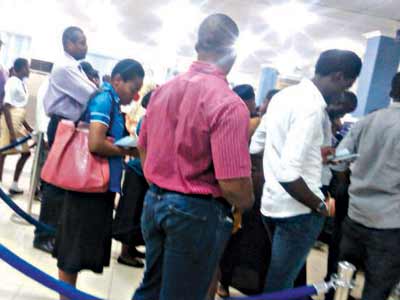 • Experts link low patronage with inadequate platforms
• Experts link low patronage with inadequate platforms
UNTIL about three years ago, Nigeria was essentially a cash based economy. Then, the banks had to contend with high volume of transactions, which resulted in long queues at banking halls. The queues alone made banking difficult, to the extent that many Nigerians decided to remain unbanked.
But with the introduction of cashless policy, which heralded adoption of electronic banking, through ATM, Point of sale (POS) and others, the Central Bank of Nigeria (CBN) intended to bring banking hall and banking services close to the people, even in the comfort of their homes.
With the cashless policy, there were expectations of improved security, as it was intended to discourage movement of cash, and reduce traffic at the banking halls.
The policy has however not met these expectations, as queues refused to disappear. Some customers complained that the policy has limited their cash transactions, no matter the type of electronic transaction they use.
But competition in Nigerian banking sector has become intense, partly due to regulatory imperatives of universal banking and also due to customers’ awareness of their rights. Bank customers have become increasingly demanding; they require high quality, low priced, immediate service delivery and improved value from their chosen banks.
And in the face of all these complaints, some continue to shy away from all forms of electronic banking, like ATM, that are devoid of queue.
Findings show that queues have returned in banks where facilities are limited and cannot meet up with demand. Not too many bank customers can withstand the queues, yet they are reluctant to fully embrace the cashless policy.
Mrs. Ayo Sobowale, who spoke with The Guardian at a banking hall in Bariga, Lagos, during the week said, “ I come to the bank for my transactions because I don’t know how to operate these modern gadgets.” She has no other electronic mail facility to receive notifications on her account, except by text message, which she receives on her phone.
A trader at Bariga market, close to the bank, Mrs. Adebowale Zainab also expressed the same sentiment. “My children say you can send money without entering a bank, but because I don’t know how to use it, I just go into the bank, fill the deposit slip and queue for the transaction. Sometimes, I send my children.”
Persons not literate in computer usage do not only exhibit low adaptability to cashless policy, they also resist the usage as some of them lack trust for the system, given the rise in fraud all over the world.
At one of the new generation banks on Airport road, a customer, John Eze said, “my trust in Internet banking has not reached the level of participation, even the Point of Sale machine sometimes debits twice. I received emails from my bank encouraging me to engage the modern platforms for transactions, but it is not a priority to be going in and out to get token.”
Mr. Uche Kalu, who was also on queue in the same bank, said he does his transactions on his phone without going into a bank. But he needed to pay his children’s school fees, as the school always deman deposit slip, rather than an electronic copy, so he didn’t have a choice than to join the long queue.
Even after complaining about the long queue, Mrs. Sola Adebayo, a fashion designer said, “I had applied to get a token for internet banking, but I have not gone back to collect it, and I can’t say when I would have the time to go back.”
A senior staff of one of the new generation banks, who spoke on the basis of anonymity said, “banks need to continuously educate their customers on the use of various electronic media, because introducing additional platforms would compound the problem, as many Nigerians are not technologically oriented. For instance, the banking hall will continue to be full because many Nigerians are still skeptical about the ATM, despite efforts for additional security”
Continuing, he said, “the banks are also not providing enough electronic platforms, like the ATM machines, especially in Lagos. If you visit areas such as Ikorodu, Magboro, Awoyaya, Langbasa at any of the weekends, you will see people waiting to cash money through the ATM, and it is the same everywhere. People suffer immensely at weekends when banks don’t reload their ATMs, and you cannot rule out the challenge of service. When you experience these things, you are more likely to jettison the ATM and just use your chequebook,” he said.
An economics lecturer at the University of Lagos, Dr. Dele Balogun said, “queues in banks are indications that banks might be suffering liquidity squeeze. Sometimes the cash in vault might not be enough to meet daily transactions, but they won’t tell you, they use delay tactics, so that when people pay in money, they can then give cash to customers making withdrawal.”
According to Balogun, banks, which tried to upgrade their systems, ran into difficulties. Sometimes, the ATM machine does reject card or fails to recognise the card hardware, even when it is issued by the same bank.
“Banking queues go beyond the banks, illiteracy is not the issue of banks alone, because if there is financial exclusion as a result of weak financial market, it means the authorities concerned have to create a framework to include marginalised people, especially the small scale, micro enterprises that don’t earn regular income, by establishing more mobile banks to help collect small savings from such people. Banks also need to increase their efficiency; the authorities should relax the rules to include those that are marginalised,” Balogun added.



